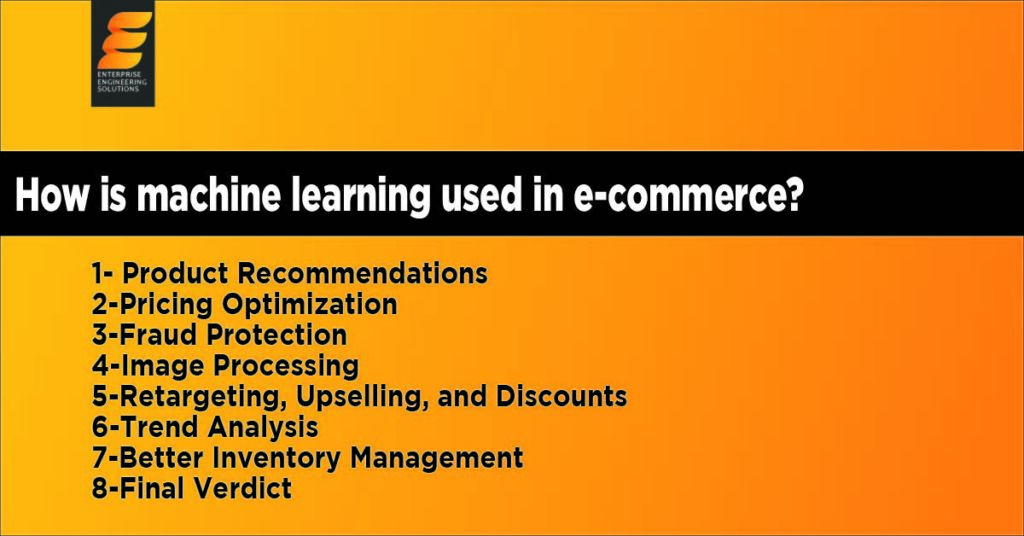E-commerce organizations can use machine learning to provide a more personalized client experience. Customers today not only want to engage with their favourite businesses on a personal level; instead, they have evolved to demand it. In fact, according to research, 73 per cent of customers are tired of being bombarded with useless content.
Retailers may use artificial intelligence and machine learning to tailor each connection with their customers, giving them a better experience. They can use machine learning consulting to prevent customer service problems in advance.
Cart turnover rates should decrease as a result, and sales should increase. Customer support bots, unlike humans, can deliver unbiased responses 24 hours a day, seven days a week.
How is Machine Learning used in E-commerce?
The recommendation engine is the most extensively utilized role of AI in e-commerce. A good product recommendation algorithm can significantly increase your income and average order value.
A recommendation method is a sophisticated data filtering tool that uses machine learning algorithms to suggest the most appropriate product to a buyer.
The algorithms use information such as the customer’s most recent purchase, purchasing history, preferred colors, typical budgets, etc.
Pricing Optimization
Using machine learning consulting, retailers can calibrate prices driven by supply and demand, minimum price, operational expenses, competitiveness, and other factors.
Manually completing all of this isn’t easy. AI automates massive volumes of data collecting, processing, and analysis to provide better real-time dynamic pricing. This also aids organizations in recognizing early trends and forecasting demand for products for which transaction data is not available.
Fraud Protection
Chargebacks are the biggest nightmare of any online retailer. Most shoppers, especially first-time customers, believe that e-stores are untrustworthy. E-commerce stores are vulnerable to fraudulent activity. E-commerce business owners must exercise extraordinary prudence. It is not uncommon for businesses, especially internet businesses, to shut their gates due to a bad image. As a result, companies must not cut corners when detecting and combating fraud.
Machine learning can substantially limit the scope of fraudulent behavior. It can quickly evaluate large amounts of time-consuming, recurring data and detect illegal transactions earlier on by proactively detecting any abnormalities.
Image Processing
Retailers engage in artificial intelligence (AI) and image recognition technologies to influence consumer (buyer) behavior and automate processes. Investing in information visualization with visual search capabilities could help you match images of consumers with similar clothing sold online, for example. This could be determined by a user’s request based on the type of things they typically purchase (color, brand) and data from media platforms.
Another e-commerce machine learning application is its help in automatically filling in the subject information based on the photo.
Retargeting, Upselling, and Discounts
Not every person who visits your website will make a purchase. Some may seek product information, while others may put something in their cart and then abandon it. Using dynamic retargeting, upselling, and discounts, machine learning consulting can assist get more individuals to finish their transactions.
Machine learning allows e-commerce stores to better retarget consumers by analyzing data to see what has worked in the past to acquire similar profiles via retargeting. ML analyses millions of profiles, analyzing their behavior and outcomes to anticipate what will most likely convert a consumer.
Trend Analysis
Before you put things available for auction on an e-site, you should research their popularity: is it a best-seller, a regular seller, or out of date?
Whether from an outsourcing provider or internal fulfillment, procurement is influenced by trend analysis. If statistics are not carefully monitored, returned items will play a significant role in procurement. As a result, analyzing a product’s trend is crucial, as it can help lower the catalog’s total size, product maintenance costs, and warehouse space utilization.
This is made simple with machine learning because it analyses and compares product evaluations, ratings, and media platform inputs. Low-rated products may be removed from the site’s inventory.
Better Inventory Management
Inventory management is one of the most persistent issues in e-commerce. Manual stock control can be time-consuming (particularly for e-commerce stores) and can hurt accurate sales forecasting, leading to financial flow issues. ML can significantly improve the accuracy of future demand predictions. It will make supply chain management more accessible, but it will also ensure that you better understand your clients and their behaviors.
Stock replenishment is required to avoid stockouts and guarantee that client requests are met promptly. Inventory replenishment can be automated using Artificial Intelligence algorithms based on previous and current sales information. This can be set up for “Pick up from store” and “Deliver to customer” scenarios.
Final Verdict
Machine learning is here to stay in e-commerce. It has various practical applications in eCommerce, as we’ve seen. How machine learning is used in e-commerce may interest you if you wish to improve your e-commerce operations.
Machine learning is being embraced by many e-commerce companies, which are reaping significant benefits from it. ML may be a substantial advantage for firms that automate time-consuming, labor-intensive, and costly manual procedures. It can provide internet retailers with helpful information on their customers. They can assist internet businesses in increasing clicks, converting prospects into customers, keeping them, and even developing strong customer relationships.






